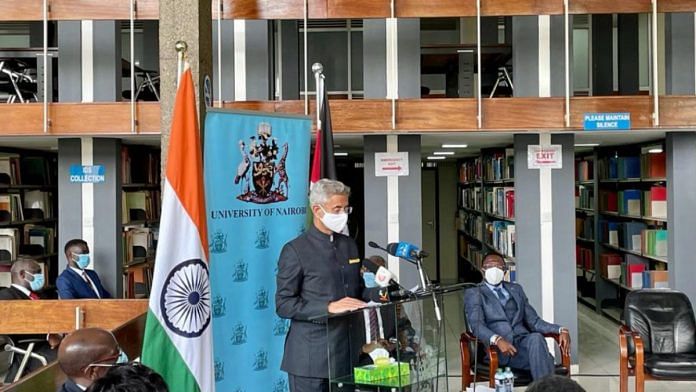Nairobi: The rise of modern Africa is a “long awaited expectation”, External Affairs Minister S Jaishankar said on Monday, underlining that the decisions made by the international community will be really global only when the continent’s voice is adequately heard and reform made in the leading bodies like the UN Security Council.
Jaishankar said that both as a solidarity and a strategy, India stands with Africa. “Within our capacities, we have partnered with as much a large heart as with an open mind. Your priorities guide our initiatives,” he said.
Jaishankar made the comments during the inauguration of the renovated Mahatma Gandhi Memorial Library in the prestigious University of Nairobi here. He arrived in Kenya on Saturday on a three-day visit to strengthen India’s relations with the major East African country.
“The rise of modern Africa is not just a noble sentiment, it is a long awaited expectation, even a profound calculation. It is only when this continent of more than a billion people takes its rightful place, that a full diversity of our planet will find proper expression.
“It is then that we can justifiably declare that the world is truly multi polar. Decisions made by the international community will be really global only when Africa’s voice is adequately heard. And that must happen most of all by reform in leading bodies like the UN Security Council where today India and Kenya have seats as non-permanent members for two years,” he said.
During the event, Jaishankar said that this is also a time to reflect on the larger significance of the relationship between India and Kenya.
“India’s association with this university goes back decades and the very memory of Mahatma Gandhi was meant to underline our strong solidarity. It also reminds us of the Kenyans with Indian heritage who have contributed so much for this university’s growth and success,” he said.
The minister said that the sentiment has not diminished in the decades that have passed but has taken the form of practical South-South cooperation of which this project is one small example.
There are numerous other activities that involve human resources and nurturing talent that stand as testimony to the deep bonds between the two countries, he said.
Highlighting the initiatives taken by the two countries to strengthen the bilateral relationship, including in the educational sector, Jaishankar said these illustrations should evoke a discussion on how to refashion the relationship for contemporary times.
“I believe that the core continues to be the solidarity forged by our shared struggle last century. But they must also take into account the new challenges that have emerged since,” he said.
Jaishankar said that the pandemic has brought home the dangers of relying on limited geographies. When supply chains are disrupted and demand outstrips supply, the more vulnerable will inevitably get short changed.
“Africa cannot afford that to continue. And this goes against the very spirit of South-South cooperation. The direct lesson from the pandemic is the need today, pressing need I would say, for decentralised globalisation,” he said.
Underlining that due to the pandemic, health and food security have become far more central which makes a compelling case for enhancing capacities in Africa.
“And that would only happen when partnerships genuinely aimed at Africa’s welfare deliver more extensively on development projects. Indeed, development itself will only unfold when it is based on deeper capacities,” Jaishankar said.
He said that his visit has contributed to a new agenda of cooperation that is now in the making and which is shaped by the vision that Prime Minister Narendra Modi and Kenyan President Uhuru Kenyatta have of the relationship.
“In 1956, the statue of Mahatma Gandhi was unveiled at this University. Six decades later, the modernisation of this library is a reminder of what brings us together. “It is only by greater international cooperation and stronger capacities that result from it, that we can, in the Mahatma’s words, bring about the change we seek. India and Kenya have the opportunity to demonstrate that their partnership can make a difference,” he said. –PTI
Also read: Jaishanker holds online interaction with Indian diaspora during Kenya visit



